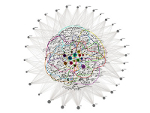 Outreach
Outreach
OUTREACH
Collective phenomena in Wikipedia: Cooperation and conflict
The process of conflict resolution in Wikipedia, an iconic, collaboratively edited encyclopedia, is described as the result of the competition between direct interactions among editors and their interactions with a globally shared medium, such as a Wikipedia article. Darwin himself wondered on the origin of the noble virtue of human cooperation being difficult to explain by natural selection. Today, information-communication technology has opened up unprecedented opportunities of solving complex tasks as a collective emergent phenomenon involving the cooperation of many individuals across the world. This has enabled such collaborative projects like open software development or the CERN experiments. While this leads to a higher level of synergy, unavoidably conflicts of diverse opinions are generated, signalled in Wikipedia by an unusually high number of edits in an article. Our model of how Wikipedia works reproduces key stylized features of conflict dynamics observed in real-world Wikipedia articles. For example, with a fixed number of editors forming one 'mainstream' and two opposing 'extremist' groups, consensus in the medium's content is only achieved after a long time and it may not correspond to the initial mainstream view. In the case of a dynamic environment where new editors replace older ones, periods of conflict and consensus can alternate indefinitely, depending on the rate of newcomers and the degree of controversy in the article's topic. The understanding of these mechanisms provided by our model opens the way for the improvement of the conditions for value production in collaborative environments.
Reference
Opinions, Conflicts and Consensus: Modeling Social Dynamics in a Collaborative Environment, Jáanos Török, Gerardo Iñiguez, Taha Yasseri, Maxi San Miguel, Kimmo Kaski, and János Kertész.
![]()
- UIB Press Release
- CSIC Press Release
- SINC Press Release
- Geekosystem Press
- Revista Cálculo
- 168 óra
- Orient Press
- Index
- CEU
- Science Daily
- Spanish National Research Council (including a short movie)
- University of Oxford
- Aalto University
- Phys.org
- Radio BBC Oxford (live interview)
![]()
- Vídeo










